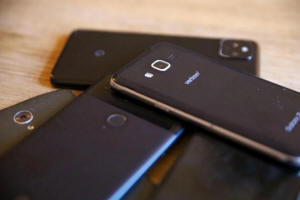Pritzker wants Illinois to be latest state to ban cellphones in
classroom
[March 07, 2025]
By Ben Szalinsk
Are cellphones a useful tool or a distraction in the classroom?
According to Gov. JB Pritzker, they’re a distraction, and he has
proposed banning them during classroom instruction.
Pritzker proposed legislation during his State of the State speech in
February that would call for banning cellphones during classroom
learning time. However, his proposal would not ban cellphones in school
entirely, meaning students may still be allowed to use their devices
between classes. Private schools would not be included in the ban.
“In conversations with educators from around the state, there is one
thing most commonly cited as an impediment to classroom learning:
cellphones,” Pritzker said at a news conference Thursday in Champaign.
Some of Illinois’ largest school districts already have adopted their
own limits on cellphones in their classrooms, including Springfield,
Peoria and Champaign.
“We want our students’ phones turned off so their minds can be fully
engaged in learning,” Champaign Unit 4 School District Superintendent
Sheila Boozer said.
The Champaign district implemented cellphone limits beginning last fall
and said the response from parents and teachers has been positive.
“Since every student is provided with a Chromebook for schoolwork, a
cellphone is not really necessary for their learning,” Boozer said.
Schools would be required to come up with their own guidelines for
securely storing the phones during instructional time. Pritzker’s plan
would also prohibit students from being fined or punished by a law
enforcement officer for violating a no-cellphone policy.
“Study after study has demonstrated the benefits of a ban in classroom
use of cellphones, not just on student performance but on overall health
and well-being,” Pritzker said. “Bullying goes down while grade point
averages and Advanced Placement test scores goes up.”

Pritzker’s proposal would include several exemptions to such a ban,
including in the event of an emergency, when a teacher allows students
to use wireless devices for educational purposes or when a doctor
requires a student to have or use their phone for medical reasons.
[to top of second column]
|

Gov. JB Pritzker is asking lawmakers to pass a plan banning
cellphones in schools during class time. (Capitol News Illinois
photo by Andrew Adams)

At some recent school shootings, such as in Uvalde, Texas, students made
critical 911 calls. Rep. Patrick Sheehan, R-Lockport, who is a
Plainfield police officer, told Capitol News Illinois its important
students can access a cellphone in emergencies.
“The kids having these devices to be able to call 911 dispatch so that
they can get to the police officers, it cuts down on the response time
and completely saves lives,” Sheehan said.
Sheehan said it’s important students have a distraction-free
environment, but he cautioned against schools enacting a policy that
could lock phones away from students.
“Taking away the cellphones and putting them in some sort of lock or
away from the student, as a parent I don’t like it,” Sheehan said. “And
as a police officer, I definitely don’t like it.”
Eight states enacted some type of limit on cellphones in schools last
year, Stateline reported last month. This year, Illinois is one of 13
states where legislation has been proposed to limit cellphones in
schools.
A 2023 Pew Research poll of public school teachers found 72% of high
school educators believe cellphone distractions are a “major problem” in
their classroom. But 60% of high schools teachers said it is also
difficult to enforce cellphone policies.
Bans on cellphones during class time are generally popular among U.S.
adults. While 53% do not support banning phones in schools for the
entire day, 68% support banning them during class, according to a 2024
Pew poll.
Capitol News Illinois is
a nonprofit, nonpartisan news service that distributes state government
coverage to hundreds of news outlets statewide. It is funded primarily
by the Illinois Press Foundation and the Robert R. McCormick Foundation. |